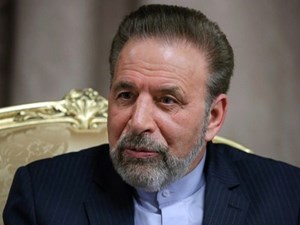Iran complicates sanctions talks with demands that predate the U.S. nuclear deal
(Bloomberg) - Iran and the U.S. are haggling over problems with the nuclear deal that predated the Trump administration’s 2018 withdrawal from the accord, a top Iranian government official said, suggesting that negotiations to bring Washington back into the fold have become more complicated than previously known.
Mahmoud Vaezi, President Hassan Rouhani’s chief of staff, said the U.S. had agreed in principle to lift all of the more than 1,000 economic sanctions that were reimposed or added by Donald Trump after he exited the deal, including those on Iran’s oil, petrochemicals, banking and steel sectors. But broader trade penalties on Iran’s financial sector that weren’t lifted under the 2015 pact with world powers had scared off foreign investors and banks, preventing Tehran from receiving many of the economic benefits that it had expected to flow from its agreement to rein in its nuclear program.
“Right now, we’re discussing which of the remaining sanctions are related to the nuclear deal and which ones relate to before 2015,” Vaezi told reporters in Tehran, according to the Iranian Students’ News Agency. “Also, now it’s possible some of the sanctions related to individuals and matters prior to 2015 will remain, and they are also negotiating over those.”
Previously, Iran had said it was focused on removing the Trump-era sanctions, so Vaezi’s comments may indicate that the scope of the negotiations has widened. Tehran has refused to change the agreement to address U.S. concerns about its ballistic missile program and military activities in the region.
Resuscitation of the deal would allow Iran to return to global oil markets in exchange for curtailing contentious nuclear work, and ease a standoff that has stoked military frictions in the energy-rich Gulf.
Trump’s withdrawal from the deal three years ago created a crisis defined by tit-for-tat attacks on shipping, oil installations and assassinations of key Iranian military and nuclear figures that almost led to another war in the Middle East.
World powers, led by the European Union, have spent the past three months in Vienna trying to bring that chapter of turmoil to an end by brokering a pathway back to the original accord that would see the U.S. return to the deal and also re-establish previous limits on Iran’s atomic work.
“The negotiations in Vienna aren’t easy and that has become clear in the last few weeks,” German Foreign Minister Heiko Maas said at a press conference in Berlin, adding he was confident that the newly elected Iranian government of hardline cleric Ebrahim Raisi will bring about a new environment where “there’s good possibilities to conclude talks in the foreseeable future.”
On Wednesday, in a reminder of how Iran’s atomic work has often been the target of attacks widely blamed on U.S. ally Israel, state news agencies said authorities in Iran had foiled an attempt to “sabotage” a site on the outskirts of Tehran belonging to the Atomic Energy Organization of Iran.
In a separate statement Vaezi also condemned the U.S. Department of Justice for blocking three dozen news websites run by Iran’s state broadcaster on Tuesday, including the English-language Press TV.
“This bogus U.S. policy is not constructive while nuclear deal negotiations are underway,” Vaezi said. “Iran will certainly retaliate in case there are similar examples from their side in Iran.”
The U.S. said it seized the sites in retaliation for what it described as an attempt to influence American elections.
The seizures add another element of tension to the negotiations on the nuclear deal, which have entered especially delicate territory. On Thursday, Iran’s agreement with the International Atomic Energy Agency over nuclear inspections is set to expire. And Rouhani, who shepherded the agreement on Iran’s side, will be handing over the presidency to a hardline cleric -- personally sanctioned by Trump -- who was elected last weekend.
A government spokesman on Tuesday raised the possibility that talks to rescue the nuclear deal could extend beyond the end of Rouhani’s tenure in August.
Vaezi said there was an agreement with the U.S. to lift “a number of sanctions on individuals” including people close to Supreme Leader Ayatollah Ali Khamenei, but he didn’t give details or specify whether they included Raisi.



